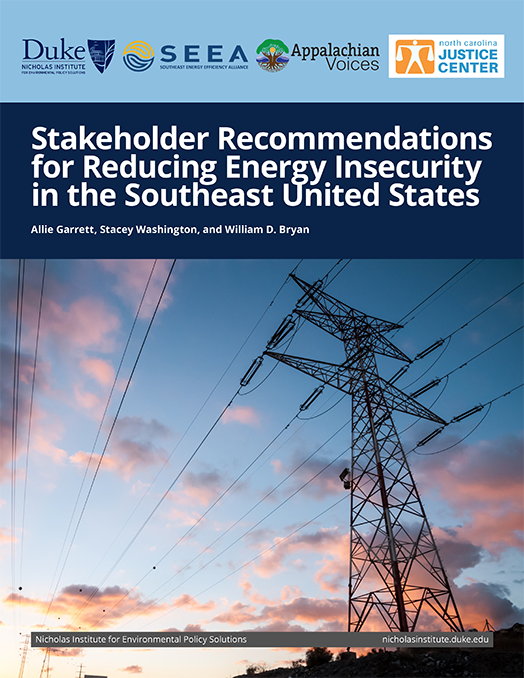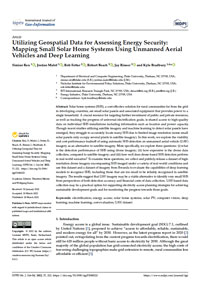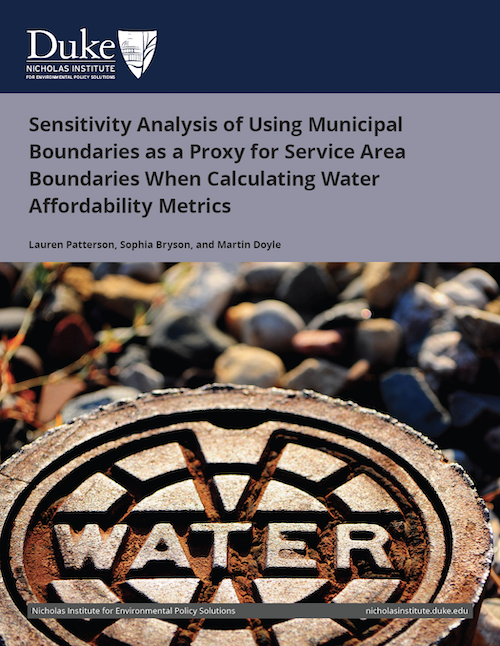Publications
Stakeholder Recommendations for Reducing Energy Insecurity in the Southeast United States
Energy insecurity—the inability to maintain energy services like heating and cooling—is one of the most pressing issues in the Southeast, where more than one out of every four households face access or affordability challenges. The Southeast Energy Insecurity Stakeholder Initiative facilitated broad, collaborative discussions among a range of regional stakeholders to identify opportunities for reducing energy insecurity in the region.
Two Years In: A Progress Update on the North Carolina Energy Efficiency Roadmap
Energy efficiency provides a least-cost option for meeting energy demand while also lowering energy bills and reducing greenhouse gas emissions. In 2019, the Nicholas Institute for Environmental Policy Solutions published the North Carolina Energy Efficiency Roadmap outlining 32 recommendations for enhancing energy efficiency in the state of North Carolina. This policy brief provides a two-year update on the status of those recommendations.
SIMPL: Generating Synthetic Overhead Imagery to Address Custom Zero-Shot and Few-Shot Detection Problems
Recently deep neural networks (DNNs) have achieved tremendous success for object detection in overhead (e.g., satellite) imagery. One ongoing challenge however is the acquisition of training data, due to high costs of obtaining satellite imagery and annotating objects in it. In this article, we present a simple approach—termed Synthetic object IMPLantation (SIMPL)—to easily and rapidly generate large quantities of synthetic overhead training data for custom target objects.
Tracking the Benefits of Natural & Working Lands in the United States: Dataset Evaluation and Readiness Assessment
Natural and working lands (NWL) in the United States provide many benefits, including food, climate mitigation, recreational opportunities, jobs, and many more. There is currently no coordinated approach in the United States to track how provision of these benefits is changing over time. This project begins to fill this gap by identifying datasets that can be used to track the status and trends of NWL benefits (i.e., ecosystem services), assessing their readiness for use in the near-term, and highlighting data gaps and limitations that need to be addressed for a national assessment.
The Evolving Global Plastics Policy Landscape: an Inventory and Effectiveness Review
Governments worldwide are increasingly adopting public policies, laws, and ordinances to reduce plastic pollution. To date, studies have not analyzed the content of, and trends in, these policies. Employing a content analysis and literature search, we set out to better understand: (i) governments responses to this problem over time, and (ii) the state of the available evidence on the effectiveness of policy responses.
A snapshot of the economic benefits from foreign bottom trawling in coastal West Africa: A mutually-beneficial trade in services, no winners or extractivism?
Large-scale fishing effort in the waters of tropical and lower income countries is predominantly driven by ‘distant water fishing fleets’ often owned by companies based in a small number of countries and has been associated with a range of negative environmental and social outcomes. West Africa is an example where such fleets are a dominant feature. In the waters of Guinea-Bissau, Guinea, Sierra Leone, Liberia and Ghana, 75% of all licensed bottom trawl vessels in 2017 either registered (‘flagged’) or largely owned in China.
Pricing Plastics Pollution: Lessons from Three Decades of Climate Policy
Plastic is now the most widely used human-made substance on the planet, and plastics pollution impacts marine and coastal ecosystems, local economies, and human health. Local and national governments are increasingly responding by banning plastic bags and other specific plastic products, taxing the use of certain plastics, and improving waste management and recycling. These are important steps, but alone they will not result in a meaningful reduction in cumulative plastics pollution or encourage development of sufficient alternatives to plastic. Additional policy measures are necessary.
Utilizing Geospatial Data for Assessing Energy Security: Mapping Small Solar Home Systems Using Unmanned Aerial Vehicles and Deep Learning
Solar home systems (SHS), a cost-effective solution for rural communities far from the grid in developing countries, are small solar panels and associated equipment that provides power to a single household. A crucial resource for targeting further investment of public and private resources, as well as tracking the progress of universal electrification goals, is shared access to high-quality data on individual SHS installations including information such as location and power capacity.
Uncommitted State Revolving Funds
States and the federal government invest in water, wastewater, and stormwater infrastructure by providing subsidized loans and other financial assistance through State Revolving Fund (SRF) programs. The funds are capitalized with federal grants, state contributions, leveraged bonds, and loan repayments. Because the programs largely provide loans rather than grants, the repayment of principal and interest replenishes the pool of capital to finance infrastructure over time. Loan repayments are now the largest source of capital for SRFs.
Sensitivity Analysis of Using Municipal Boundaries as a Proxy for Service Area Boundaries When Calculating Water Affordability Metrics
Water is essential for life, and yet one of the nation’s most pressing water challenges has become ensuring that water services are affordable for households and communities. While there has been growing attention and concern around affordable water services, the actual scale of the problem remains poorly understood, in part because of the lack of data availability.









